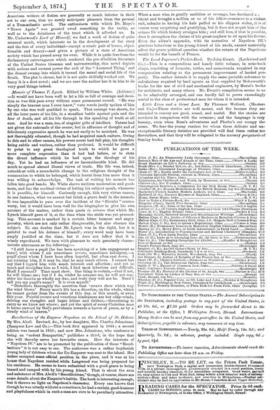Memoir of Thomas T. Lynch. Edited by William White. (Isbister.)
—It would not have been well to let a life so full of courage and devo- tion as was -this pass away without some permanent record. "He was simply the bravest man I ever knew," were worda justly spoken of him by one who was well qualified to speak. That courage was shown, for all the later years of his life, in a steadfast battle against pain and the fear of death, and all _his life through in the speaking of truth at all cost. And he was a man, too, of singular gifts of intellect. Nature had not given the externals of the orator, but in affluence of thought and of felicitously expressive speech he was not easily to be matched. He was not thoroughly educated, though he had acquired much culture. Owing to this and to other causes, his powers never had full play, his thoughts being subtle and various, rather than profound. It would be difficult to point to any great theological truth to which he gave a more complete expression than it had bad before, or to state the direct influence which he had upon the theology of his day. Yet he had an influence of no inconsiderable kind. He did much to spread abroad liberal views of truth. His life was, indeed, coincident with a remarkable change in the religious thought of the communion to which he belonged, which learnt from him more than it was willing to acknowledge. The task of writing his memoir has fallen into good hands. Mr. White shows uniform moderation and good. taste, and has the cardinal virtue of letting his subject speak, whenever it is possible, for himself. Curiously enough, this very virtue causes, in one instance, what we cannot but think a grave fault in the memoir. It 1778,9 impossible to pass over the incident of the "Rivulet " contro- versy, but it would have been well for the biographer to give his own account of the matter, rather than quote in extenso that which Mx. Lynch himself gave of it, at the time when the strife was yet proceed- ing. This account is marked by a certain bitter humour and angry jocosity, which are not only rather disagreeable, but also obscure the subject. No one doubts that Mr. Lynch was in the right, but it is painful to read his defence of himself ; every word may have been amply justified at the time, but it does not follow that it is wisely reproduced. We turn with pleasure to such genuinely charac- teristic utterances as the following:— " I etill have a pupil [he has been speaking of a late engagement as tutor] with whom I am sometimes severe, sometimes indulgent,—a pupil about whom I have been often hopeful, but often east down. I am training him, if it may be, that he may teach others. I cannot but say that I regard him with much interest and affection ; and yet to teach and discipline him as I wish, I find most laborious and difficult. Shall I succeed? Time must show. One thing is certain,—that if not, he will blame me; but if I do, whilst he esteems me, he will not con- sider his thanks as wholly my due, and truly they will not be. Need I tell yea my pupil's name ? It is even myself."
"Disbelieve thoroughly the assertion that 'straws show which way the wind blows.' Every man's life has a direction, on the whole, which he cannot gather from the events of this day, or this month, or even this year. Painful events and vexatious hindrances are but eddy-winds, driving our thoughts and hopes hither and thither,—threatening to carry us we know not where ; and yet the spirit of every Christian man is borne onward by God's providence towards a haven of peace, as by a steady wind of heaven."






























 Previous page
Previous page